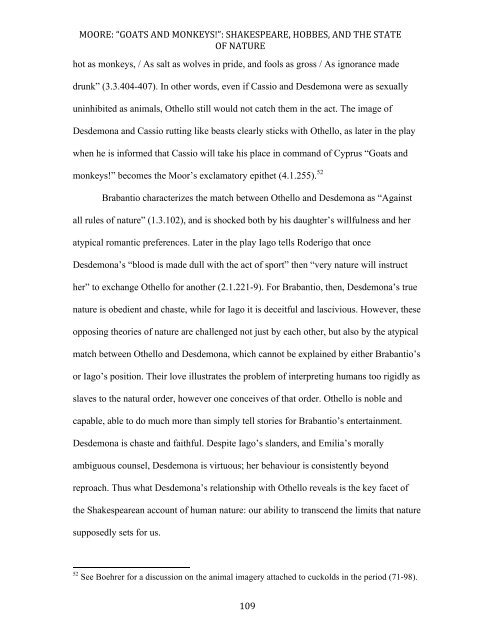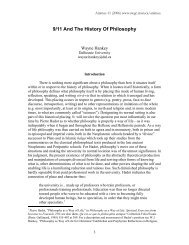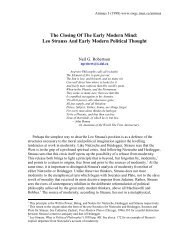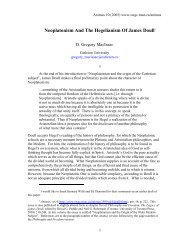âgoats and monkeys!â: shakespeare, hobbes, and the state of nature
âgoats and monkeys!â: shakespeare, hobbes, and the state of nature
âgoats and monkeys!â: shakespeare, hobbes, and the state of nature
Create successful ePaper yourself
Turn your PDF publications into a flip-book with our unique Google optimized e-Paper software.
MOORE: “GOATS AND MONKEYS!”: SHAKESPEARE, HOBBES, AND THE STATE <br />
OF NATURE <br />
hot as <strong>monkeys</strong>, / As salt as wolves in pride, <strong>and</strong> fools as gross / As ignorance made<br />
drunk” (3.3.404-407). In o<strong>the</strong>r words, even if Cassio <strong>and</strong> Desdemona were as sexually<br />
uninhibited as animals, O<strong>the</strong>llo still would not catch <strong>the</strong>m in <strong>the</strong> act. The image <strong>of</strong><br />
Desdemona <strong>and</strong> Cassio rutting like beasts clearly sticks with O<strong>the</strong>llo, as later in <strong>the</strong> play<br />
when he is informed that Cassio will take his place in comm<strong>and</strong> <strong>of</strong> Cyprus “Goats <strong>and</strong><br />
<strong>monkeys</strong>!” becomes <strong>the</strong> Moor’s exclamatory epi<strong>the</strong>t (4.1.255). 52<br />
Brabantio characterizes <strong>the</strong> match between O<strong>the</strong>llo <strong>and</strong> Desdemona as “Against<br />
all rules <strong>of</strong> <strong>nature</strong>” (1.3.102), <strong>and</strong> is shocked both by his daughter’s willfulness <strong>and</strong> her<br />
atypical romantic preferences. Later in <strong>the</strong> play Iago tells Roderigo that once<br />
Desdemona’s “blood is made dull with <strong>the</strong> act <strong>of</strong> sport” <strong>the</strong>n “very <strong>nature</strong> will instruct<br />
her” to exchange O<strong>the</strong>llo for ano<strong>the</strong>r (2.1.221-9). For Brabantio, <strong>the</strong>n, Desdemona’s true<br />
<strong>nature</strong> is obedient <strong>and</strong> chaste, while for Iago it is deceitful <strong>and</strong> lascivious. However, <strong>the</strong>se<br />
opposing <strong>the</strong>ories <strong>of</strong> <strong>nature</strong> are challenged not just by each o<strong>the</strong>r, but also by <strong>the</strong> atypical<br />
match between O<strong>the</strong>llo <strong>and</strong> Desdemona, which cannot be explained by ei<strong>the</strong>r Brabantio’s<br />
or Iago’s position. Their love illustrates <strong>the</strong> problem <strong>of</strong> interpreting humans too rigidly as<br />
slaves to <strong>the</strong> natural order, however one conceives <strong>of</strong> that order. O<strong>the</strong>llo is noble <strong>and</strong><br />
capable, able to do much more than simply tell stories for Brabantio’s entertainment.<br />
Desdemona is chaste <strong>and</strong> faithful. Despite Iago’s sl<strong>and</strong>ers, <strong>and</strong> Emilia’s morally<br />
ambiguous counsel, Desdemona is virtuous; her behaviour is consistently beyond<br />
reproach. Thus what Desdemona’s relationship with O<strong>the</strong>llo reveals is <strong>the</strong> key facet <strong>of</strong><br />
<strong>the</strong> Shakespearean account <strong>of</strong> human <strong>nature</strong>: our ability to transcend <strong>the</strong> limits that <strong>nature</strong><br />
supposedly sets for us.<br />
52 See Boehrer for a discussion on <strong>the</strong> animal imagery attached to cuckolds in <strong>the</strong> period (71-98).<br />
109
















